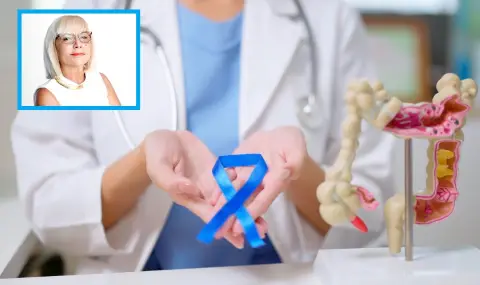Colon cancer… More and more people are faced with this diagnosis. What are the best ways of prevention and why screening is key to reverse the negative trend in our country. Prof. Dr. Galina Kurteva, long-time head of the Chemotherapy Clinic at the University Specialized Hospital for Active Oncology Treatment in Sofia, spoke to FAKTI.
- Prof. Kurteva, “the silent killer“ – is this how we can determine colon cancer…
- This is the most accurate epithet with which this disease can be described. Colon cancer cases are detected at a very late stage, when the disease has spread to other organs of the body. The reason for the late diagnosis is most often expressed in the absence of symptoms until the last moment. The disease “lives” quietly in people's bodies without causing tangible problems, discomfort and pain until it becomes obvious and unavoidable. Usually then it is already too late for prevention and the patient has to undergo surgery and treatment, but depending on the condition.
- Sochi is the second deadliest cancer in Bulgaria? Why?
- That's right - this is confirmed by current data. Colon cancer is the second deadliest cancer in the country. It is also the second most common cancer among women and the third most common cancer among men. The cases are detected at a late stage of the development of the disease, precisely because of the lack of symptoms in the initial stages. Something more that is important to say. All this is mainly due to the fact that regular screening for early detection of the disease is not carried out in Bulgaria. The negative statistics for our country do not end there. According to the latest data from the OECD and the EC, Bulgaria is the only country in the European Union where an increase in cancer mortality is reported. This is a clear proof that we are lagging behind in all indicators of awareness and prevention.
- Why are there no symptoms…
Colon cancer symptoms are easily ignored because they may not cause pain or unusual discomfort. What's more, many people with colon cancer have no symptoms until the disease is advanced.“
- Is there an age limit at which it is more pronounced…
- The guidelines for early detection of the disease and the implementation of screening programs define as the most risky age range between 50 and 74 years - for both women and men. People over the age of 50, as well as everyone under this age who have direct relatives with this disease, should be regularly screened.
- What causes colon cancer…
- The specific cause of colon cancer is still unknown, but there are factors that can increase the likelihood of its development, such as excessive consumption of red and processed meat, alcohol, smoking and an overall unhealthy lifestyle.
We are talking about risk factors for the development of colorectal cancer when there is a family burden or chronic inflammatory bowel diseases are present, as well as when the age is over 50 years.
- Is there any prevention? What can people do?
- Prevention for any disease is leading a balanced lifestyle and diet. In the specific case, regular physical activity, consumption of foods containing fiber, fruits and vegetables, limiting alcohol and smoking help.
In 2003, the Council of the European Union recommended that member states introduce colon cancer screening. Two decades later, Bulgaria lags behind the EU countries in terms of prevention and early diagnosis.
- How is colon cancer screening done?
- One of the widely used methods is to perform an occult (hidden) bleeding test, which is used to detect blood in the stool. This could be a sign of the presence of polyps or a tumor. This is standard practice for most European countries.
In case of a positive test, additional examinations or tests must be done, since the presence of blood in the stool can be due to other reasons that are not necessarily related to colon cancer. Therefore, it is recommended to have a consultation with the personal physician or a gastroenterologist and, if necessary, to schedule a colonoscopy.
At the moment, everyone aged 50-74 can benefit from free examinations within the initiative of the "Lachezar Tsotsorkov" Foundation, which has been taking place since the end of March in the country. It is necessary for those who wish to provide faecal material the size of a pea, placed in a clean container to one of the laboratories that are part of the campaign - there are more than 300 of them. An interactive map and a list of all the laboratories that are partners in the initiative can be seen at site: Together against colon cancer.
Prof. Kurteva in front of FACTS: Colon cancer cases are detected at too late a stage
The reason for the late diagnosis is most often expressed in the lack of symptoms until the last moment, says the doctor
Apr 12, 2024 09:06 135
